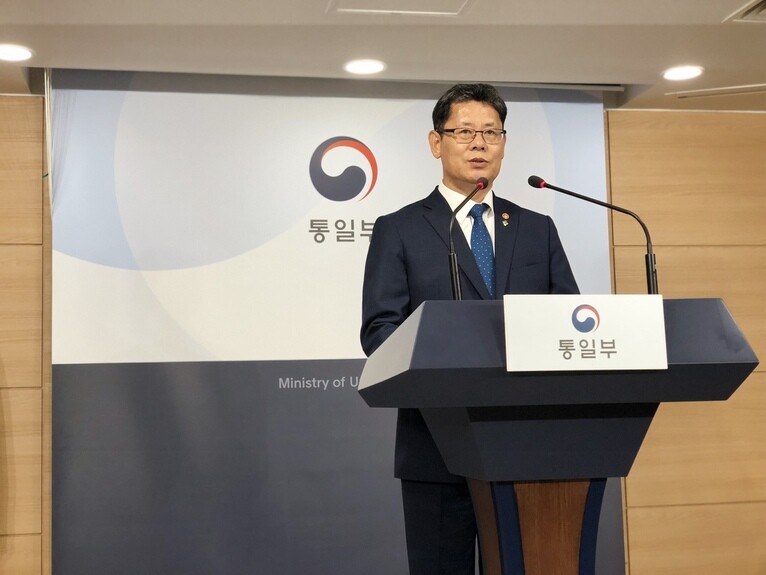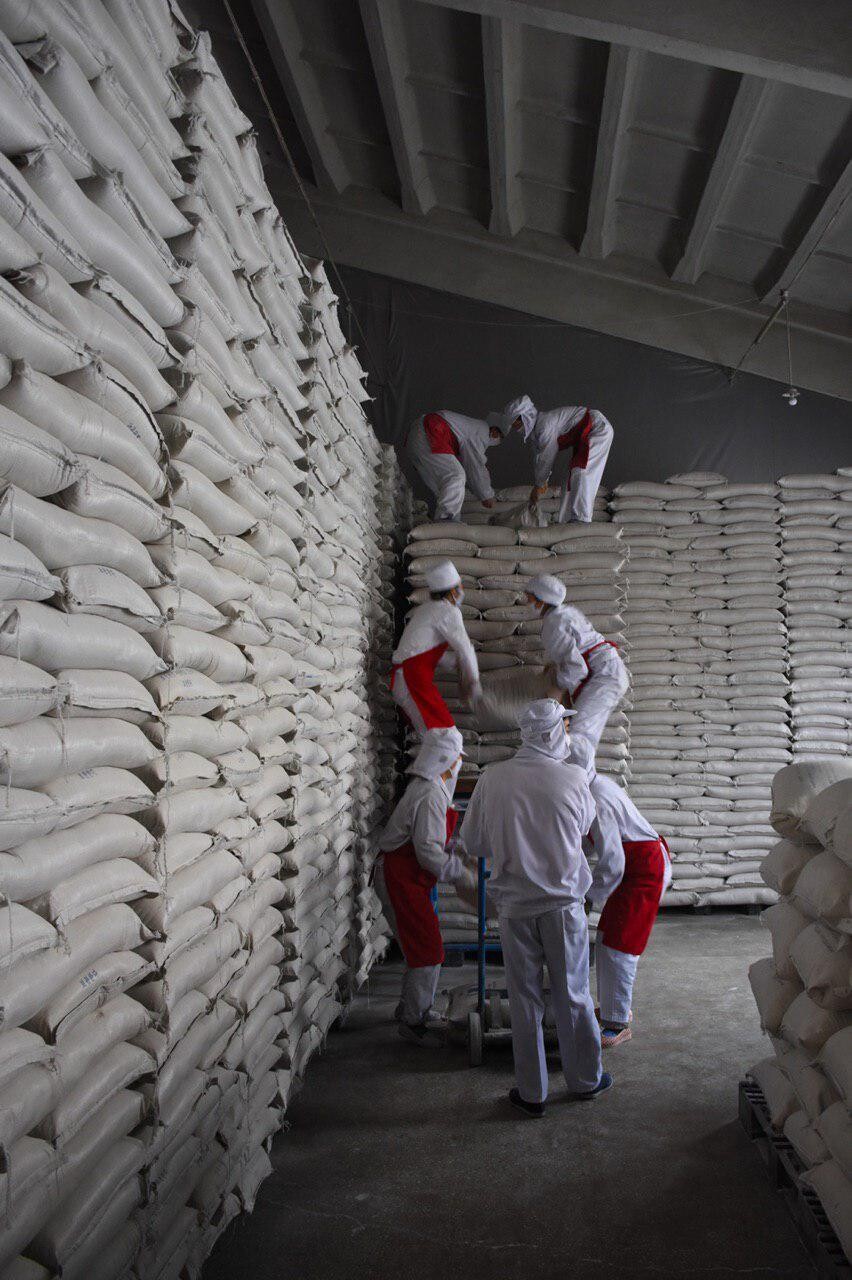hankyoreh
Links to other country sites 다른 나라 사이트 링크
S. Korea to provide 50,000 tons of domestic rice to N. Korea via WFP

The South Korean government plans to provide 50,000 tons of domestic rice as aid to North Korea through the UN’s World Food Programme (WFP).
“Following close discussions with the WFP in light of the North Korean food situation, the government has decided to provide initial support of 50,000 tons of domestic rice to North Korea,” said Minister of Unification Kim Yeon-chul in a press conference at the Central Government Complex in Seoul on the afternoon of June 19.
“The government looks forward to the food provided through the WFP being conveyed to the North Korean people as quickly as possible,” Kim said, adding that the “schedule and scope for additional food aid to North Korea will be decided at a later date after we observe the results of this support.”
First and foremost, the announced measures were intended as a fraternal and humanitarian gesture in response to the North Korean food shortage, which has been characterized as the “worst in the past 10 years” amid a shortfall of anywhere from 1.36 million tons (according to a joint WFP/FAO study) to 1.48 million tons (according to North Korean Ambassador to the UN Kim Song) compared to its needs. They represent a “goodwill pump-priming” measure aimed at ushering inter-Korean relations toward improvement amid their deadlock since the North Korea-US summit in Hanoi.
They are also poised to serve a stepping stone role to minimize the negative impact of a possible long gap between the provision of US$8 million from Inter-Korean Cooperation Fund for WFP and UNICEF nutrition aid and mother-and-child health support projects by WFP and UNICEF – the transfer of which was completed on June 11 – and large-scale direct aid with domestic rice, which has yet to be finalized.
Seoul reportedly decides to provide large-scale direct aid to the North with domestic rice
Internally, the South Korean government has reportedly decided in principle on providing large-scale direct aid to the North with domestic rice. It previously spoke publicly about the possibility of direct aid during an NSC standing committee meeting presided over on May 17 by National Security Office Director Chung Eui-yong.
“Regarding food aid to North Korea, we have decided to examine a specific support plan involving support through an international organization [WFP] or direct support while also amply investigating public opinion,” the government said at the time. While announcing the plans to provide 50,000 tons in domestic rice as aid, Kim Yeon-chul added the word “initial” to describe the support.
The government gave five reasons to justify the need for food aid: “① A food shortage that has been described as the ‘most severe in the past 10 years,’ ② our inability to ignore the survival struggles experienced by our fellow Koreans in the North, ③ contributing to inter-Korean reconciliation and cooperation and restoring homogeneity, ④ unrelatedness to the international community’s sanctions [against North Korea], and ⑤ contributing to establish trust and a positive atmosphere between North Korea and the US.” In effect, the aid has a multi-purpose function.
The chief reason for the South Korean government adopting the approach of aid through an international agency rather than direct aid for the first time in 12 years has to do with the intensive sanctions in place from the UN and the US and the resulting difficulties in transportation. Because of the large volume, the food aid would have to be transported by sea rather than by land, which would require a decision by the UN Sanctions Committee on North Korea to grant an exception for the vessel in question. The policy determination appears to be that it would relatively easier to clear the sanctions barrier for WFP – a UN-affiliated humanitarian agency that is currently operating in North Korea – than for the South Korean government itself.

The decision to provide 50,000 tons of domestic rice – as opposed to relatively inexpensive Vietnamese, Thai, or Chinese rice – reflected a combination of policy considerations, with the aim of reducing some of the difficulties for South Korean farmers and agriculture, and political considerations, with the hope of enlisting the tacit support of lawmakers from the Liberty Korea Party and other conservative opposition parties who represent agricultural communities.
Around 1.3 million tons of domestic rice has currently been stockpiled. With annual storage fees amounting to over 480 billion won (US$411.66 million), the result has been a severe waste of money and vocal complaints from farmers. The budget to cover the 50,000 tons in domestic rice aid would be paid by the Inter-Korean Cooperation Fund, which is operated by the Ministry of Unification for the unhindered execution of North Korea policy efforts, and the Grain Management Special Account, which is administered by the Ministry of Agriculture, Food and Rural Affairs to support domestic farmers and agriculture – reflecting the project’s status as both aid to North Korea and support for domestic farmers and farming.
Observers are predicting the government will use the aid as a stepping stone toward proceeding with large-scale direct domestic rice aid at an appropriate time in the near future and leveraging that for improvements in inter-Korean relations – including progress on the divided family issue, which is seen as having a major impact on public opinion.
By Lee Je-hun, senior staff writer, and Noh Ji-won, staff reporter
Please direct comments or questions to [english@hani.co.kr]

Editorial・opinion
![[Column] Season 2 of special prosecutor probe may be coming to Korea soon [Column] Season 2 of special prosecutor probe may be coming to Korea soon](https://flexible.img.hani.co.kr/flexible/normal/500/300/imgdb/original/2024/0426/3317141030699447.jpg) [Column] Season 2 of special prosecutor probe may be coming to Korea soon
[Column] Season 2 of special prosecutor probe may be coming to Korea soon![[Column] Park Geun-hye déjà vu in Yoon Suk-yeol [Column] Park Geun-hye déjà vu in Yoon Suk-yeol](https://flexible.img.hani.co.kr/flexible/normal/500/300/imgdb/original/2024/0424/651713945113788.jpg) [Column] Park Geun-hye déjà vu in Yoon Suk-yeol
[Column] Park Geun-hye déjà vu in Yoon Suk-yeol- [Editorial] New weight of N. Korea’s nuclear threats makes dialogue all the more urgent
- [Guest essay] The real reason Korea’s new right wants to dub Rhee a founding father
- [Column] ‘Choson’: Is it time we start referring to N. Korea in its own terms?
- [Editorial] Japan’s rewriting of history with Korea has gone too far
- [Column] The president’s questionable capacity for dialogue
- [Column] Are chaebol firms just pizza pies for families to divvy up as they please?
- [Column] Has Korea, too, crossed the Rubicon on China?
- [Correspondent’s column] In Japan’s alliance with US, echoes of its past alliances with UK
Most viewed articles
- 1[Column] Season 2 of special prosecutor probe may be coming to Korea soon
- 2‘We must say no’: Seoul defense chief on Korean, USFK involvement in hypothetical Taiwan crisis
- 3Is N. Korea threatening to test nukes in response to possible new US-led sanctions body?
- 4Division commander ordered troops to enter raging flood waters before Marine died, survivor says
- 5Amnesty notes ‘erosion’ of freedom of expression in Korea in annual human rights report
- 6Is Japan about to snatch control of Line messenger from Korea’s Naver?
- 7No good, very bad game for Korea puts it out of Olympics for first time since 1988
- 8[Editorial] Korea’s surprise Q1 growth requires objective assessment, not blind fanfare
- 9N. Korean delegation’s trip to Iran shows how Pyongyang is leveraging ties with Moscow
- 10Korea’s 1.3% growth in Q1 signals ‘textbook’ return to growth, says government